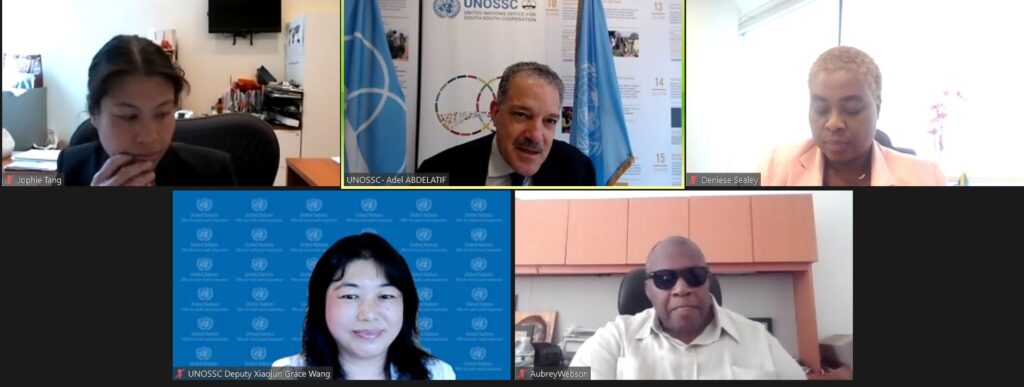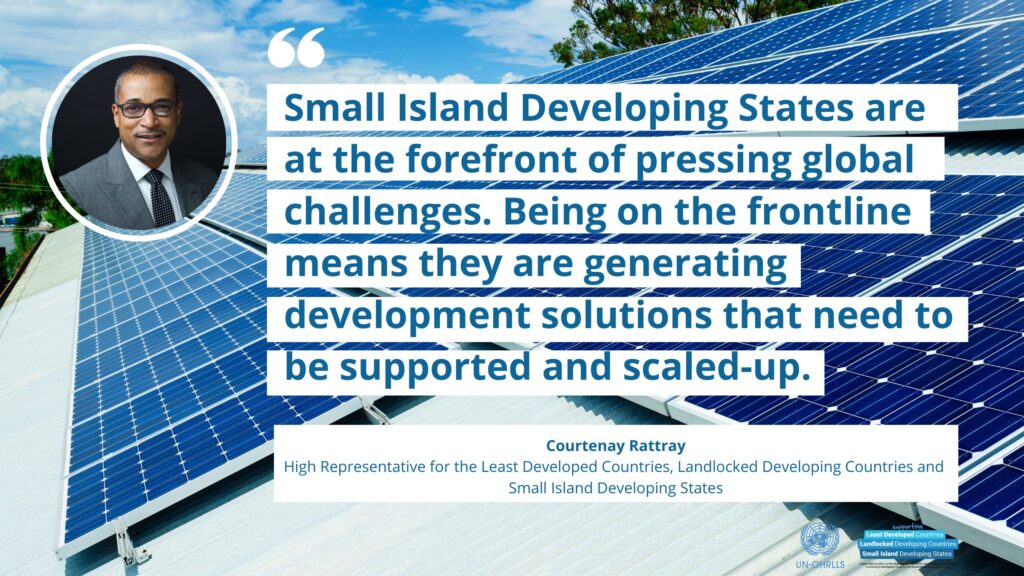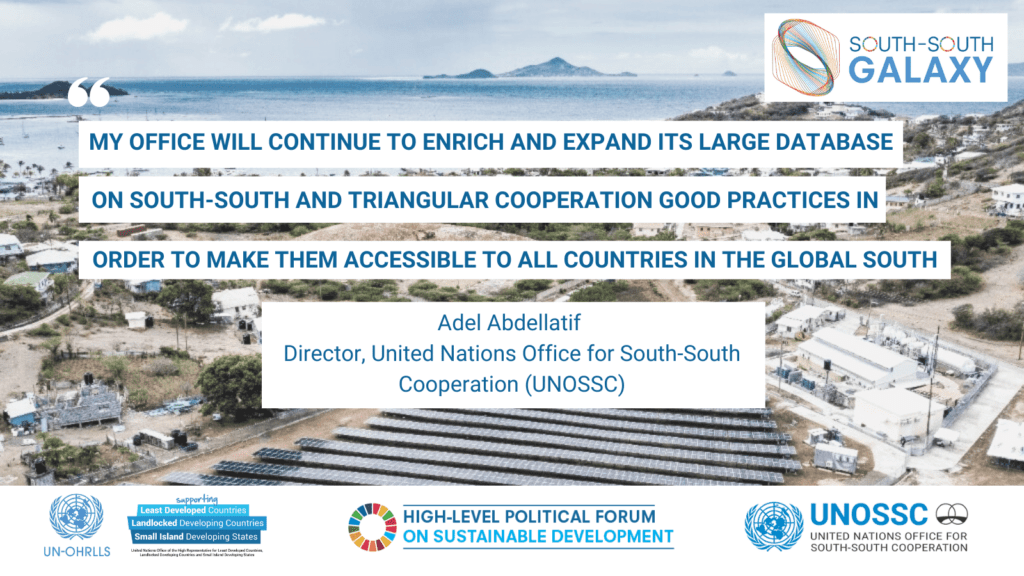On 7 July 2021, the United Nations Office for South-South Cooperation (UNOSSC) and the Office of the High Representative for the Least Developed Countries, Landlocked Developing Countries and Small Island Developing States (UN-OHRLLS) jointly launched a special edition good practices publication at a side-event for the UN High-level Political Forum (HLPF) 2021, titled “Good Practices in South-South and Triangular Cooperation for Sustainable Development in SIDS – Advancing the SAMOA Pathway and Achieving Sustainable Recovery”.
Also available on BiliBili.
The publication showcases the innovative ways that South-South cooperation can support SIDS to overcome shared challenges and accelerate progress towards sustainable development, including recovery from COVID-19. Close to 50 effective South-South and triangular practices and innovative development solutions are presented in areas such as climate change, sustainable energy, sustainable transport and disaster risk reduction.
In the foreword to the publication, Achim Steiner, Administrator, UNDP, urges the development community to share South-South proven solutions to socio-economic challenges. He highlights numerous solutions including Mauritius’ efforts to assist low-income households to gain access to solar power, Drones for Resilience project bolstering disaster preparedness and disaster risk management., Fiji and and Vanuatu’s , unique “farm to table project” that expands organic farming practices.
At the event, speakers from UNOSSC, UN-OHRLLS, Alliance of Small Island States (AOSIS) and Pacific Islands Development (PIDF) shared perspectives on the importance of this publication, and representatives from SIDS countries – The Federated States of Micronesia, Republic of Singapore and Jamaica – presented good practices from the publication.
Moderator Ms. Xiaojun Grace Wang, Deputy Director, UNOSSC welcomed all speakers and participants to the event, emphasizing the importance of South-South knowledge sharing and the SIDS publication. “Knowledge has no boundaries, knowledge has no hierarchy” said Ms. Wang.
During the event, she also highlighted several innovative good practices in the publication including the UNCDF-supported climate adaptive living facility to the UNESCO, Government of China and Government of Republic of Korea’s project to strengthen institutional capacities for safeguarding and promoting intangible cultural heritage in the Pacific states.
In his opening remarks, H.E. Amb. Walton A. Webson, Permanent Representative of Antigua & Barbuda, and Chair of AOSIS highlighted that SIDS faced “multiple capacity constraints due to size, remoteness and exposure to external shocks,” and that the “increase in partnerships with countries from the South is an added advantage” to SIDS efforts for development.
Amb. Webson called on the development community to make a “concerted effort” to learn from each other

Mr. Courtenay Rattray, Under Secretary-General, UN-OHRLLS, stressed his office’s commitment to support the good work done by SIDS, and to mapping and sharing good practices. He highlighted the importance of supporting SIDS. “Small Island Developing States are at the forefront of pressing global challenges. Being on the frontline means they are generating development solutions that need to be supported and scaled up,” he said.

Mr. Adel Abdellatif, Director a.i, UNOSSC, highlighted that the recently endorsed UN system-wide strategy on South-South Cooperation “acknowledges the incorporation of South-South Cooperation in the major multilateral agreements including the SIDS Accelerated Modalities of Action (SAMOA) Pathway” and that the “
He reiterated UNOSSC’s commitment to furthering South-South cooperation and shared that South-South Galaxy would ensure that all the good practices in the special SIDS edition would reach a wider audience, and the knowledge shared would “connect solution providers with solutions seekers and facilitate cross country and cross regional partnerships and collaborations.”

Opening remarks were followed by the launch of the “Good Practices in South-South and Triangular Cooperation for Sustainable Development in SIDS – Advancing the SAMOA Pathway and Achieving Sustainable Recovery” publication, with a short video to mark the launch of the publication.
This special edition of good practices is expected to inspire governments, private sector and entrepreneurs, civil society and non-governmental organizations and citizens, in general, to adopt, improve and share the best practices that aim to contribute to the well-being of countries and communities in the Global South.
Also available on BiliBili.

Followed by the formal launch of the publication at the side-event, representatives from the SIDS countries presented selected good practices from the publication and shared experiences and learnings.
His Excellency, Secretary Andrew Yatilman, Minister of the Department of Environment, Climate Change and Emergency Management (DECEM) from the Federated States of Micronesia, in a recorded message, highlighted a good practice from the publication: Climate Early Warning Systems in Pacific Island Countries project implemented by UNDP and supported by the UN-India Development Partnership Trust Fund, managed by UNOSSC.
H.E. Ambassador Solo Mara, Secretary-General of the Pacific Islands Development Forum (PIDF) shared PIDF’s experiences with the good practice related to Solarization of Head of State Residences in member countries to promote the use of solar energy through the installation of solar photovoltaic systems in Pacific Island Countries.
Ms. Jophie Tang, Deputy Permanent Representative, Permanent Mission of the Republic of Singapore shared the country’s experiences with South-South Cooperation including strategies, successes, challenges, solutions and priorities, and highlighted several good practices from the publication, including Singapore’s Climate Action Package – capacity-building programmes to support climate action efforts in developing countries.
Ms. Deniese Sealey, Charge d’Affaires/Deputy Permanent Representative, Permanent Mission of Jamaica to the United Nations shared good practices including the Caribbean Community’s collaboration with Chile on public health policies to address overweight and obesity issues, implemented by PAHO/WHO; United Arab Emirates (UAE)-Caribbean Renewable Energy Fund that provides grants to Caribbean SIDS including Jamaica; and Global Environment Facility Small Grants Programme-supported project for Sustainable Agriculture and Food Security with Aquaponics Technology.
During the Q&A session, Mr. Ricardo Godinho, Chief Technical Advisor, UNDP, Cabo Verde, shared the country’s experiences and outcomes from the project: Strengthening Technical and Functional Skills for Public Finance Control in Portuguese-speaking African Countries and Timor-Leste.
In his concluding remarks, Mr. Courtenay Rattray from UN-OHRLLS commended the event for bringing focus on the “wealth of information on the actions that SIDS countries are currently taking” in South-South Cooperation, especially taking into account the challenges caused by COVID-19 that have revealed the vulnerabilities of many developing countries, and particularly that of SIDS. He also highlighted that it is important to “nurture and develop home-grown solutions and encourage inter-SIDS dialogue and exchange” so the countries can learn from each other.
Access the SIDS Good Practices publication here.
Followed by the formal launch of the publication at the side-event, representatives from the SIDS countries presented selected good practices from the publication and shared experiences and learnings.
His Excellency, Secretary Andrew Yatilman, Minister of the Department of Environment, Climate Change and Emergency Management (DECEM) from the Federated States of Micronesia, in a recorded message, highlighted a good practice from the publication: Climate Early Warning Systems in Pacific Island Countries project implemented by UNDP and supported by the UN-India Development Partnership Trust Fund, managed by UNOSSC.
H.E. Ambassador Solo Mara, Secretary-General of the Pacific Islands Development Forum (PIDF) shared PIDF’s experiences with the good practice related to Solarization of Head of State Residences in member countries to promote the use of solar energy through the installation of solar photovoltaic systems in Pacific Island Countries.
Ms. Jophie Tang, Deputy Permanent Representative, Permanent Mission of the Republic of Singapore shared the country’s experiences with South-South Cooperation including strategies, successes, challenges, solutions and priorities, and highlighted several good practices from the publication, including Singapore’s Climate Action Package – capacity-building programmes to support climate action efforts in developing countries.
Ms. Deniese Sealey, Charge d’Affaires/Deputy Permanent Representative, Permanent Mission of Jamaica to the United Nations shared good practices including the Caribbean Community’s collaboration with Chile on public health policies to address overweight and obesity issues, implemented by PAHO/WHO; United Arab Emirates (UAE)-Caribbean Renewable Energy Fund that provides grants to Caribbean SIDS including Jamaica; and Global Environment Facility Small Grants Programme-supported project for Sustainable Agriculture and Food Security with Aquaponics Technology.
During the Q&A session, Mr. Ricardo Godinho, Chief Technical Advisor, UNDP, Cabo Verde, shared the country’s experiences and outcomes from the project: Strengthening Technical and Functional Skills for Public Finance Control in Portuguese-speaking African Countries and Timor-Leste.
In his concluding remarks, Mr. Courtenay Rattray from UN-OHRLLS commended the event for bringing focus on the “wealth of information on the actions that SIDS countries are currently taking” in South-South Cooperation, especially taking into account the challenges caused by COVID-19 that have revealed the vulnerabilities of many developing countries, and particularly that of SIDS. He also highlighted that it is important to “nurture and develop home-grown solutions and encourage inter-SIDS dialogue and exchange” so the countries can learn from each other.
Access the SIDS Good Practices publication here.
